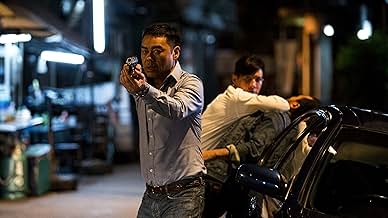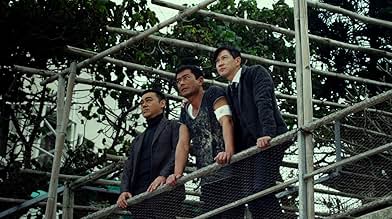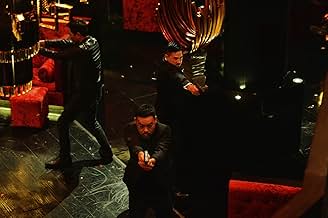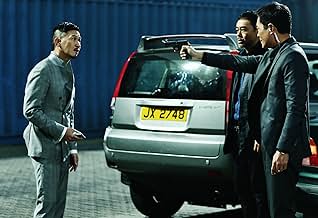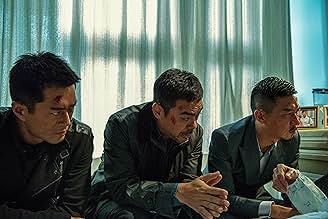IMDb-BEWERTUNG
6,6/10
3002
IHRE BEWERTUNG
Füge eine Handlung in deiner Sprache hinzuA devastating dilemma changes the fate of three cops when an undercover operation against a notorious Thai drug lord goes horribly wrong.A devastating dilemma changes the fate of three cops when an undercover operation against a notorious Thai drug lord goes horribly wrong.A devastating dilemma changes the fate of three cops when an undercover operation against a notorious Thai drug lord goes horribly wrong.
- Auszeichnungen
- 4 Gewinne & 23 Nominierungen insgesamt
Ching-Wan Lau
- Ma Ho-tin
- (as Sean Lau)
Ting Yip Ng
- Wong Shun-yik
- (as Ng Ting-Yip Berg)
Wai-Kwong Lo
- Bobby
- (as Kenneth Low)
Helena Law
- Tsz-wai's Mother
- (as Lan Law)
Treechada Petcharat
- Mina
- (as Poy)
Hugo Tsz-Hang Wong
- Monkey (Kun's Gang)
- (as Hugo Wong)
Siu-Kay Lee
- Kei (Informer)
- (as Siu-Kei Lee)
Empfohlene Bewertungen
The White Storm, the latest film from Hong Kong director Benny Chan is a undercover drug story, but it's not interested in crime genre elements or in exploring the social issue of drug production in Thailand, but the on screen chemistry between its three stars: Sean Lau, Louis Koo and Nick Cheung. The story reminded me most of John Woo's Bullet in the Head in that it was about the disintegration of a brotherhood. The dramatic conflict between the three actors are the price of admission. It has a very interesting A story that could have made a great film, but The White Storm spends a lot of the 134-minute running time telling instead of showing its story. And also like Bullet in the Head, it executes it in the hammiest way possible under the guise of Hong Kong 80′s action nostalgia.
For example, in the story Koo, Lau and Cheung are lifelong friends. The film chooses to exposit this by having the trio reminisce about singing the theme song "Pledge to Join the War" by Adam Cheng from the classic TV show "Luk Siu Feng", a classic song about brotherhood. And later on in the movie, Benny Chan plays the goddamn song. This is just about the oldest, hokiest joke in the book; they may as well have tied red headbands around their heads. People in my theater, including myself, laughed, not because it's a funny clever reference but more in surrender of how shamelessly cheesy the writers were willing to go to highlight their bromance. Yes, they are very good friends, we get it!
Sean Lau is the subtle glue that holds all this cheese together. Something I observed about Lau was that he had all the best lines and was the only one out of the three protagonists who was not given a backstory. The lines of dialogue aren't good in a cool quotable way, but it was exactly what the character would say in a given moment, no more no less. I suspect Lau rewrote a lot of his own lines. He gives a pronounced performance that's as low volume and non-showy as this production will allow, but yet he comes out as the most engaging character. It's really a testament to how underrated an actor Lau is.
Louis Koo and Nick Cheung, as good as they are and as much effort as they put in, overact compared to Lau. They are fine actors but are bogged down delivering a lot of expositional monologues stating how they feel. The romantic subplots Koo and Cheung are given almost dangerously dominate the A story. It's not their fault though, Benny Chan directs with a heavy hand. It's as if Chan and the writers constantly worry that the audience won't be able to follow what's going on, so they overcompensate.
Speaking of overcompensation, Lo Hoi-Peng shows up with crazy acting hair to chew up scenery, and boy, does he ever chew! It's entertaining watching an old man act bananas but the hair does most of the acting. It's hammy as hell. But despite of all the ham and cheese, Louis Koo, Sean Lau and Nick Cheung make very good company and are the price of admission. And at its core The White Storm is a good story about three friends, I just wished it wasn't screamed at me.
For example, in the story Koo, Lau and Cheung are lifelong friends. The film chooses to exposit this by having the trio reminisce about singing the theme song "Pledge to Join the War" by Adam Cheng from the classic TV show "Luk Siu Feng", a classic song about brotherhood. And later on in the movie, Benny Chan plays the goddamn song. This is just about the oldest, hokiest joke in the book; they may as well have tied red headbands around their heads. People in my theater, including myself, laughed, not because it's a funny clever reference but more in surrender of how shamelessly cheesy the writers were willing to go to highlight their bromance. Yes, they are very good friends, we get it!
Sean Lau is the subtle glue that holds all this cheese together. Something I observed about Lau was that he had all the best lines and was the only one out of the three protagonists who was not given a backstory. The lines of dialogue aren't good in a cool quotable way, but it was exactly what the character would say in a given moment, no more no less. I suspect Lau rewrote a lot of his own lines. He gives a pronounced performance that's as low volume and non-showy as this production will allow, but yet he comes out as the most engaging character. It's really a testament to how underrated an actor Lau is.
Louis Koo and Nick Cheung, as good as they are and as much effort as they put in, overact compared to Lau. They are fine actors but are bogged down delivering a lot of expositional monologues stating how they feel. The romantic subplots Koo and Cheung are given almost dangerously dominate the A story. It's not their fault though, Benny Chan directs with a heavy hand. It's as if Chan and the writers constantly worry that the audience won't be able to follow what's going on, so they overcompensate.
Speaking of overcompensation, Lo Hoi-Peng shows up with crazy acting hair to chew up scenery, and boy, does he ever chew! It's entertaining watching an old man act bananas but the hair does most of the acting. It's hammy as hell. But despite of all the ham and cheese, Louis Koo, Sean Lau and Nick Cheung make very good company and are the price of admission. And at its core The White Storm is a good story about three friends, I just wished it wasn't screamed at me.
I saw this for the first time few days back.
It is directed by Benny Chan n some fellas like me may remember his Who Am I n New Police Story. It has some known n familiar faces but I dont know too many names of actors from China n Hong Kong.
Three childhood friends as adults r working for the Narcotics Bureau. One among em has been undercover for a long time in a gang. His wife is pregnant n he wants to finish off the gang n start a normal life. His dream of a normal life gets more delayed when he is informed that the trio has to catch a much bigger fish with a very weird hairstyle. The entire time while viewing this film I was laughing at the villain's hairstyle n i was wondering what hairdresser on earth wud do that n finally when one of the character ridicules him for that, I couldn't stop laughing loudly. The film has some good action sequences. Bullet shells hitting on the face is unique, the sole of a foot gets shot, a bullet gets pierced in the cheek n some over the top, slo mo gun totting scenes. It also has a hand fight leading to a brutal smashing of the chin. A man gets shot n thrown in a water quarry infested with crocodiles. Ther is a very bad scene of a man not bleeding to death aft a hand chopping scene. The location of the water quarry is amazing. Characters r wearing nice watches n one of the watch is Fiyta.
Three childhood friends as adults r working for the Narcotics Bureau. One among em has been undercover for a long time in a gang. His wife is pregnant n he wants to finish off the gang n start a normal life. His dream of a normal life gets more delayed when he is informed that the trio has to catch a much bigger fish with a very weird hairstyle. The entire time while viewing this film I was laughing at the villain's hairstyle n i was wondering what hairdresser on earth wud do that n finally when one of the character ridicules him for that, I couldn't stop laughing loudly. The film has some good action sequences. Bullet shells hitting on the face is unique, the sole of a foot gets shot, a bullet gets pierced in the cheek n some over the top, slo mo gun totting scenes. It also has a hand fight leading to a brutal smashing of the chin. A man gets shot n thrown in a water quarry infested with crocodiles. Ther is a very bad scene of a man not bleeding to death aft a hand chopping scene. The location of the water quarry is amazing. Characters r wearing nice watches n one of the watch is Fiyta.
There is no shortage of Hong Kong films dealing with undercover cops deep in the mire of drug-trafficking gangs. And there also isn't a shortage of these films that focus more on the aspect of brotherhood rather than on the actual task of bringing the drug lords to justice. So what - if anything - makes 'The White Storm' stand out from the pack? To be honest, not a great deal - but that doesn't mean you won't be entertained and have some fun along the way.
In the finest tradition of 80s HK crime cinema, 'The White Storm' drips sentimentality and brotherhood right from the get go: undercover cop Kin-chow (Louis Koo) has been on the inside of a powerful drug-running gang for years and, with a baby on the way, is keen to get out. His fellow team members and childhood friends Ho-tin (Ching Wan Lau) and Tsz-wai (Nick Cheung) know they are close to getting their man and need Kin-chow to stay put. But when the opportunity comes up for the Hong Kong Police to fry an even bigger fish, the three friends find themselves in an explosive situation that will push their loyalties and friendship to the limit.
So a fairly standard plot as far as these things go but the three leads do a good job of wringing the most out of it. Despite some overly melodramatic moments - which seems to come with the territory in these kind of films - each of the leads gets enough of an opportunity to shine as their story arcs are padded out (and speaking of melodrama, a quick mention for the performance of Hoi-Pang Lo as the bad guy. It's as cliché and hammy as anything but somehow appropriate). Whilst the narrative feels a bit over long and gets dangerously close to being overly convoluted, you do feel enough of an attachment for each of the characters to follow them through on their journey. Some tightening up of the script would have paid wonders here.
But the story provides an adequate vehicle for some entertaining action set pieces. It's predominantly guns instead of fisticuffs here and whilst there's nothing that hasn't been seen before, each set piece is choreographed and shot with such gusto that you can't help but sit back and enjoy - even when things get (waaaay) over-the-top. But hey, that's part of the reason we watch these kind of films, right? I usually find Benny Chan's films a bit hit-and-miss because of either some ham-fisted bit of direction, an unnecessary amount of exposition and/or an out-of-place set piece - but here it works as a kind of pastiche of old school HK crime films. Whilst 'The White Storm' doesn't reach the heights of classic 80s HK cinema, there is definitely some fun to be had if you're in the mood for a good old brotherly shoot out.
In the finest tradition of 80s HK crime cinema, 'The White Storm' drips sentimentality and brotherhood right from the get go: undercover cop Kin-chow (Louis Koo) has been on the inside of a powerful drug-running gang for years and, with a baby on the way, is keen to get out. His fellow team members and childhood friends Ho-tin (Ching Wan Lau) and Tsz-wai (Nick Cheung) know they are close to getting their man and need Kin-chow to stay put. But when the opportunity comes up for the Hong Kong Police to fry an even bigger fish, the three friends find themselves in an explosive situation that will push their loyalties and friendship to the limit.
So a fairly standard plot as far as these things go but the three leads do a good job of wringing the most out of it. Despite some overly melodramatic moments - which seems to come with the territory in these kind of films - each of the leads gets enough of an opportunity to shine as their story arcs are padded out (and speaking of melodrama, a quick mention for the performance of Hoi-Pang Lo as the bad guy. It's as cliché and hammy as anything but somehow appropriate). Whilst the narrative feels a bit over long and gets dangerously close to being overly convoluted, you do feel enough of an attachment for each of the characters to follow them through on their journey. Some tightening up of the script would have paid wonders here.
But the story provides an adequate vehicle for some entertaining action set pieces. It's predominantly guns instead of fisticuffs here and whilst there's nothing that hasn't been seen before, each set piece is choreographed and shot with such gusto that you can't help but sit back and enjoy - even when things get (waaaay) over-the-top. But hey, that's part of the reason we watch these kind of films, right? I usually find Benny Chan's films a bit hit-and-miss because of either some ham-fisted bit of direction, an unnecessary amount of exposition and/or an out-of-place set piece - but here it works as a kind of pastiche of old school HK crime films. Whilst 'The White Storm' doesn't reach the heights of classic 80s HK cinema, there is definitely some fun to be had if you're in the mood for a good old brotherly shoot out.
"The White Storm" is a totally unreal movie about three Hong Kong narcotics cops trying to bring down a big time drug dealer. Director and co-writer Benny Chan should stick to directing. Chan's previous movie, 2011's "Shaolin," was a very well made movie that held your interest throughout. "The White Storm" is mainly a series of gunfights, very well choreographed but totally unreal. More a video game shoot-em up than a movie. In the middle of the movie, the HK cops are in Thailand to trap the drug lord. During an ensuing gun battle, the bad guys bring in a helicopter fitted with a mini-gun that blasts away at everything. For me, that was the high point of the movie, just mindless destruction with no shallow dialog from the three buddy cops. Benny Chan does a much better job as director when he works with Jackie Chan. For his next movie, Benny Chan should team up again with Jack Chan and leave the writing to others.
How often do you get the chance to see three of Hong Kong's most charismatic male actors - Sean Lau, Louis Koo and Nick Cheung - on the big screen together? And just for that very reason, you're probably entitled to go into Benny Chan's crime thriller with high expectations. Yet even though the triumvirate does not disappoint one bit, everything else about the movie set against the backdrop of the fight against illegal narcotics simply comes off underwhelming, so much so that you can't quite help but feel that their combined star wattage is somehow wasted.
No less than five writers have been credited for the sprawling narrative, which casts Lau, Koo and Cheung as childhood best friends who have since graduated into police officers of the narcotics bureau. Lau plays the de facto leader of the group, the most ambitious and headstrong of the lot, who in his role as Chief Inspector Tin also wields authority over his friends. On the other hand, Koo's Chow has been deep undercover amongst the drug dealing triads for some time now, and since risen amongst the ranks to be Hak Tsai's (Ben Lam) right hand man. But he's also disillusioned, especially with his wife expecting a baby, and wants out immediately.
Co-written by Chan himself, the script pits Tin against Chow when a sting operation supposed to be Chow's last mission is aborted at the last minute. The higher-ups want Chow to continue undercover so they can bait a larger fish - the infamous kingpin named Eight Faced Buddha (Lo Hoi Pang) of the Golden Triangle – and Tin reminds Chow of his obligation as a police officer to obey orders. Compared to Tin and Chow, Cheung's role as the soft-spoken Wai only becomes clearer at this point - he's the pacifist among the lot, the one urging calm and reason as Tin and Chow butt heads with each other.
Despite some strong initial reservations, Chow reluctantly accepts his orders to follow Hak Tsai into Bangkok to make contact with the Eight- Faced Buddha via a local dealer (Ken Lo). Needless to say, that operation set in the middle of a dense forested region ends badly - not only does Tin lose one of his men (Ng Ting Yip), he is also eventually forced to make a choice between the devil and the deep blue sea. That impossible moral dilemma at the halfway mark also marks the high point of the movie – not only is it the single most emotionally intense moment, it also marks the culmination of what is easily the most thrilling action sequence of the film.
Structured as two acts, the close of this chapter with a literal bang also represents the point at which the movie quickly goes downhill. A fundamental twist two-thirds into the film that sees the return of a key character from the dead is clichéd to say the least, not to mention the resolution that plots the trio's final showdown with Buddha at a nightclub in Macau. The character beats hardly make up for the plotting - in particular, every moment meant to be poignant seems to proceed on the mistaken notion that it must be a high strung one, meaning that the characters are consistently forced to confront each other by shouting and jostling.
Chan's direction here is also to blame. There is absolutely no subtlety to be found here, with Chan finding it necessary at every turn to crank the volume and the intensity of every scene to maximum. Not only does that make for plenty of cringe-worthy melodrama, it also creates too many moments of unnecessary histrionics. The lack of restraint applies as well to the overindulgent plot, which comes off unintentionally amusing at turns for being pure cliché. And nowhere is the excessiveness more apparent than in the final shootout, which aims for the kind of operatic grandeur associated with Johnnie To gangster movies (think 'Exiled') but falls far short by being simply too ridiculous; indeed, the sheer absurdity of that bullet-riddled showdown undermines what credibility the brotherhood-in-peril narrative had left, which ultimately rings hollow.
Just about the only element - or rather elements - holding the film together are the solid performances of the lead actors. Lau and Cheung prove yet again why they are the best actors of their generation, and despite the film's tendencies, both know absolutely better than to overplay their characters, displaying both nuance and depth in their acting. Koo has, despite his best efforts, never quite been in the same league as his two other male co-stars. His deficiencies as an actor are even more stark - especially in certain scenes where he is called upon to emote, there is a genuine sense that he is trying and perhaps trying too hard.
It's a thorough pity therefore, that despite gathering some of the best acting talents from Hong Kong, this bombastic narco-thriller fails to be as compelling as it should be. Part of the fault lies with the messy script, lacking in the discipline and focus necessary to distil a gripping story of three friends whose bond of brotherhood is put to the test; while another part of the fault also lies with Chan's distinct lack of awareness for excess, and whether in terms of drama or action, the tone is obstinately over-the-top. It isn't Chan's finest moment that's for sure, and seeing as how there is no shortage of similar thrillers like 'Drug War' or 'Protégé', this latest addition is worthwhile only for being the rare opportunity to watch three of Hong Kong's finest actors share the screen together.
No less than five writers have been credited for the sprawling narrative, which casts Lau, Koo and Cheung as childhood best friends who have since graduated into police officers of the narcotics bureau. Lau plays the de facto leader of the group, the most ambitious and headstrong of the lot, who in his role as Chief Inspector Tin also wields authority over his friends. On the other hand, Koo's Chow has been deep undercover amongst the drug dealing triads for some time now, and since risen amongst the ranks to be Hak Tsai's (Ben Lam) right hand man. But he's also disillusioned, especially with his wife expecting a baby, and wants out immediately.
Co-written by Chan himself, the script pits Tin against Chow when a sting operation supposed to be Chow's last mission is aborted at the last minute. The higher-ups want Chow to continue undercover so they can bait a larger fish - the infamous kingpin named Eight Faced Buddha (Lo Hoi Pang) of the Golden Triangle – and Tin reminds Chow of his obligation as a police officer to obey orders. Compared to Tin and Chow, Cheung's role as the soft-spoken Wai only becomes clearer at this point - he's the pacifist among the lot, the one urging calm and reason as Tin and Chow butt heads with each other.
Despite some strong initial reservations, Chow reluctantly accepts his orders to follow Hak Tsai into Bangkok to make contact with the Eight- Faced Buddha via a local dealer (Ken Lo). Needless to say, that operation set in the middle of a dense forested region ends badly - not only does Tin lose one of his men (Ng Ting Yip), he is also eventually forced to make a choice between the devil and the deep blue sea. That impossible moral dilemma at the halfway mark also marks the high point of the movie – not only is it the single most emotionally intense moment, it also marks the culmination of what is easily the most thrilling action sequence of the film.
Structured as two acts, the close of this chapter with a literal bang also represents the point at which the movie quickly goes downhill. A fundamental twist two-thirds into the film that sees the return of a key character from the dead is clichéd to say the least, not to mention the resolution that plots the trio's final showdown with Buddha at a nightclub in Macau. The character beats hardly make up for the plotting - in particular, every moment meant to be poignant seems to proceed on the mistaken notion that it must be a high strung one, meaning that the characters are consistently forced to confront each other by shouting and jostling.
Chan's direction here is also to blame. There is absolutely no subtlety to be found here, with Chan finding it necessary at every turn to crank the volume and the intensity of every scene to maximum. Not only does that make for plenty of cringe-worthy melodrama, it also creates too many moments of unnecessary histrionics. The lack of restraint applies as well to the overindulgent plot, which comes off unintentionally amusing at turns for being pure cliché. And nowhere is the excessiveness more apparent than in the final shootout, which aims for the kind of operatic grandeur associated with Johnnie To gangster movies (think 'Exiled') but falls far short by being simply too ridiculous; indeed, the sheer absurdity of that bullet-riddled showdown undermines what credibility the brotherhood-in-peril narrative had left, which ultimately rings hollow.
Just about the only element - or rather elements - holding the film together are the solid performances of the lead actors. Lau and Cheung prove yet again why they are the best actors of their generation, and despite the film's tendencies, both know absolutely better than to overplay their characters, displaying both nuance and depth in their acting. Koo has, despite his best efforts, never quite been in the same league as his two other male co-stars. His deficiencies as an actor are even more stark - especially in certain scenes where he is called upon to emote, there is a genuine sense that he is trying and perhaps trying too hard.
It's a thorough pity therefore, that despite gathering some of the best acting talents from Hong Kong, this bombastic narco-thriller fails to be as compelling as it should be. Part of the fault lies with the messy script, lacking in the discipline and focus necessary to distil a gripping story of three friends whose bond of brotherhood is put to the test; while another part of the fault also lies with Chan's distinct lack of awareness for excess, and whether in terms of drama or action, the tone is obstinately over-the-top. It isn't Chan's finest moment that's for sure, and seeing as how there is no shortage of similar thrillers like 'Drug War' or 'Protégé', this latest addition is worthwhile only for being the rare opportunity to watch three of Hong Kong's finest actors share the screen together.
Wusstest du schon
Top-Auswahl
Melde dich zum Bewerten an und greife auf die Watchlist für personalisierte Empfehlungen zu.
- How long is The White Storm?Powered by Alexa
Details
- Erscheinungsdatum
- Herkunftsländer
- Offizieller Standort
- Sprachen
- Auch bekannt als
- The White Storm
- Drehorte
- Produktionsfirmen
- Weitere beteiligte Unternehmen bei IMDbPro anzeigen
Box Office
- Weltweiter Bruttoertrag
- 44.670.277 $
- Laufzeit
- 2 Std. 20 Min.(140 min)
- Farbe
- Sound-Mix
- Seitenverhältnis
- 2.35 : 1
Zu dieser Seite beitragen
Bearbeitung vorschlagen oder fehlenden Inhalt hinzufügen


